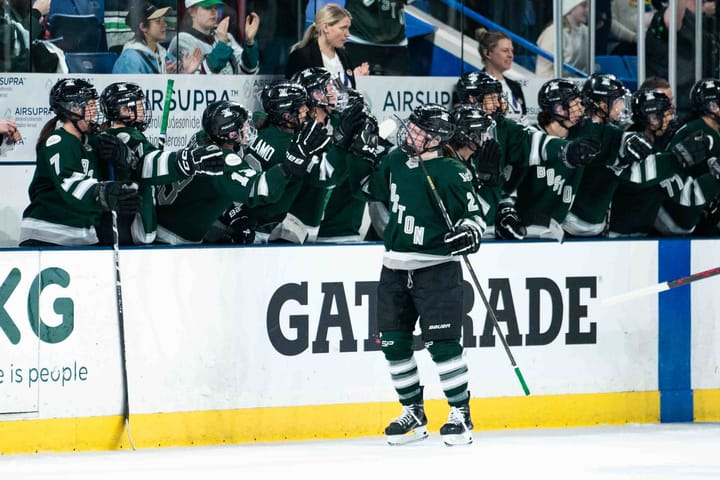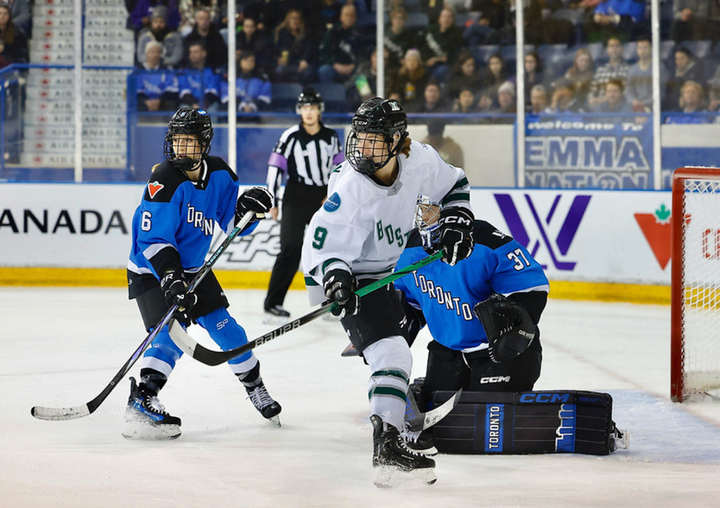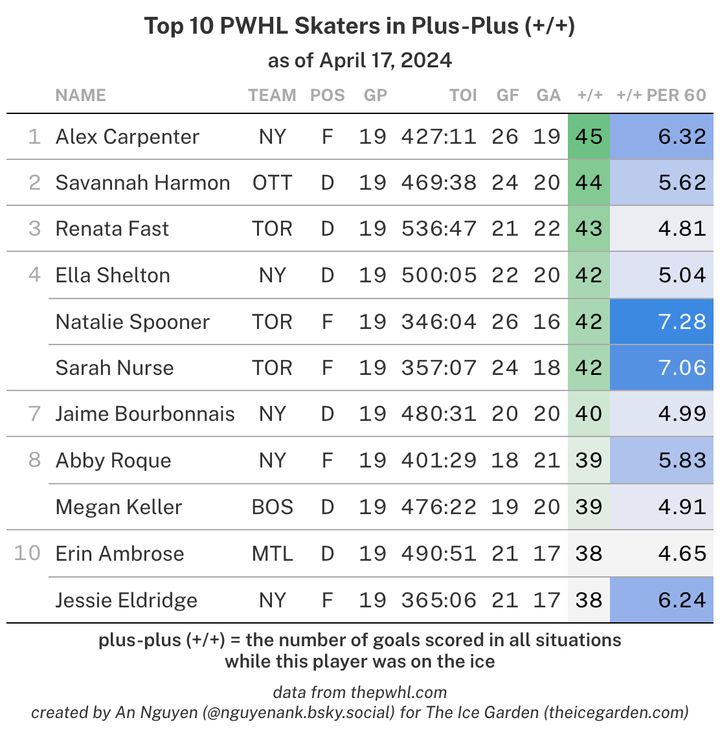2018-19 NWHL Preview: A primer on the league
A look back at where the league’s been and where it’s going
The National Women’s Hockey League is about to embark on its fourth season. Founded by former Northeastern University hockey player Dani Rylan in 2015, the NWHL was the first women’s professional league to pay its players. It was based in the northeast United States with four teams: the Buffalo Beauts, the Boston Pride, the Connecticut Whale, and the New York Riveters (now the Metropolitan Riveters, more on that later). At the onset, the league owned and operated all four teams from its offices in New York City.
The Past
Each NWHL season has had its own set of ups and downs. This is not a comprehensive history per se, but it should get new fans up to speed and help returning fans keep track of what’s happened so far.
Season 1 | 2015-16
The creation of the NWHL was exciting for American women’s hockey fans. Every active American national team member left the Canadian Women’s Hockey League in favor of the NWHL. Most went to the Boston Pride, leaving the Boston Blades of the CWHL to do so.
The beginning of the Whale’s first season went swimmingly as they won 11 games in a row before floundering in the second half of the season. The Riveters, on the other hand, struggled mightily, only winning four games all season.
On Dec. 31, the CWHL and the NWHL met in an outdoor game as part of the NHL’s Winter Classic in Foxborough, Mass. The game was hastily planned. The US national team members were participating in a training camp, so the Pride played with a lineup made up of Pride players, Pride practice players, and other NWHLers who had Boston connections. What most remember from that game is Denna Laing’s severe spinal cord injury when she slid into the boards head first.
The Pride won the Isobel Cup in a best-of-three game series over the Beauts.
The end of season one saw a lawsuit against Rylan and the league from one of its investors and. Around that same time, rumors surfaced about the league having issues paying its bills.
Season 2 | 2016-17
The biggest storyline of the second season was the league’s decision to slash salaries mid-season. The percentage cut was never publicly announced but it was enough where players left the league.
Following this, the players had other issues with the league — namely the lack of proof of insurance and the lack of transparency from the league office. The players went public on Twitter and the NWHL Players Association, with new director Anya Battaglino, took on a more active role. The season was also shortened to accommodate the schedules of the national team players going to play at IIHF World Championships in early April.
The 2017 Isobel Cup final was one of the most thrilling games of the year. For the second season in a row, the fourth-place Buffalo Beauts met the first-place Boston Pride, who had only lost one game in the regular season. The Pride were heavily favored, but goaltender Brianne McLaughlin put the Beauts on her back by stopping over 50 shots. The Beauts became the second Isobel Cup champions.
Season 3 | 2017-18
Ahead of the third season, the first NHL partnership was announced. The Riveters and the New Jersey Devils entered a three-year partnership. The Riveters re-branded, adopting the Devils’ colors and also taking the name “Metropolitan Riveters.” The Devils provided rent-free use of their practice rink (the Riveters’ home rink since season two) plus assistance with marketing, sponsorships, and ticket sales.
In the middle of the season, on Dec. 21, 2017, the Pegula Sports and Entertainment group purchased the Beauts, adding the NWHL team to their roster of nearly every other professional team in Buffalo. The historic moment made the Beauts the first, and thus far only, team to be independently owned.
The new ownership made an immediate impact. The Beauts went on a huge winning streak in 2018, leading them to their third-straight Isobel Cup Final. However, the Riveters were also extremely successful. This set up a New York state Isobel Cup Championship game that was one for the ages. The Riveters prevailed, 1-0, becoming the third Isobel Cup Champions in league history.
While the partnerships were historic and promising steps forward for the league, they also created obvious disparities in resources for players.
Season three was also marked by the lack of national team players as US (and Canadian) players centralized ahead of the PyeongChang Olympics.
The Present
This past off-season has been quite the adventure.
Westward expansion
The league expanded west, adding the Minnesota Whitecaps as the fifth team. This wasn’t the creation of a new team; Whitecaps were established in 2004 as an independent team for players after college.
Related
Minnesota Whitecaps - The Ice Garden
The addition of the Whitecaps was foreshadowed by the 2018 NWHL All-Star Weekend in St. Paul. The Skills Competition and All-Star Game featured two players from the Whitecaps, a move many saw as the league testing the waters in Minnesota. The State of Hockey is also the home to many big-name players who were raised there or played their collegiate hockey there — among them Hannah Brandt and Lee Stecklein, who predictably signed with the Whitecaps.
The Whitecaps also have an NHL partnership of their own thanks to “an alignment” with the Minnesota Wild, plus the first team-specific sponsorship in a partnership with TRIA as the team’s “official healthcare partner.”
Surprising Signings
Another major storyline heading into this season was wave after wave of surprise signings, mostly out of Buffalo. Canadian superstar Shannon Szabados shocked pretty much the whole women’s hockey world by signing with the Beauts. Dani Cameranesi did as well, because many expected her to sign in Minnesota. Other big names heading to Buffalo include Nicole Hensley, Blake Bolden (who returns to the NWHL this season after spending last season in the Swiss league), and Kelly Babstock.
Many of the moves brought about the question: what are the Beauts offering to these players? The league has said the Beauts salary cap is the same as the other teams, despite being owned the Pegulas. Through social media, it appears that the resources available to the Beauts’ players are a few levels above other teams and include benefits like practice time, access to facilities, free swag, and more.
Riveters Coaching
The Riveters took pretty much until the final days of the offseason to name a coach. They eventually named former NHLer Randy Velischek. The signing came just ahead of the Champions Cup, a historic matchup between the Riveters and the SDHL’s Luleå Hockey/MSSK.
The Cup series changed significantly during its planning stages. It started as a three-game series in Sweden before being moved to the US and downgraded to a single game. Luleå won, 4-2 against a shorthanded Riveters squad at Princeton University.
The US Olympians
After the Olympics, many US Olympians returned to the league, but some also chose to play in the CWHL. Amanda Kessel, Emily Pfalzer, Haley Skarupa, Gigi Marvin, and Amanda Pelkey are all returning to the NWHL, all to the teams they played with before the Olympics.
Hilary Knight, Kacey Bellamy, and Brianna Decker were all were members of the Boston Pride in the NWHL’s first two seasons, but will be playing for Les Canadiennes (Knight) and the Inferno (Bellamy and Decker). The departure of three big names in American women’s hockey is definitely a loss for the NWHL. Knight was a large part of the NWHL’s marketing campaign, and, due to her large social media presence, was frequently seen as “face of the NWHL” in addition to being the face of women’s hockey.
It’s important to remember that women’s hockey players are not paid a living wage, meaning players typically go where they will have jobs, family, or other connections.
The Future
Part of the NWHL’s future is tied to the CWHL and also the NHL. One of the biggest storylines of the offseason has been #OneLeague, aka the merging of the NWHL and the CWHL, and the role of the NHL in that hypothetical single women’s professional league. The two leagues merging will continue to be a looming storyline as women’s hockey continues to grow.
Partnerships and expansion will also surely be on the league’s mind. This season will be the third straight year with a game played in Pittsburgh. These neutral site games at the Penguin’s practice rink always draw extremely well, typically selling out. This season also features two games in NHL rinks: the Riveters home opener at the Prudential Center on Oct. 20, and later in the year the Beauts will host the Whitecaps at the KeyBank Center on Dec. 29.
But the league also has room to grow in raising salaries and salary caps for teams. The league does not publicly release salary information anymore, but we know it is not a living wage, forcing many players to work a full time job on top of playing hockey. Getting the league to a place where players won’t need a full time job is most likely a long ways off.





Comments ()